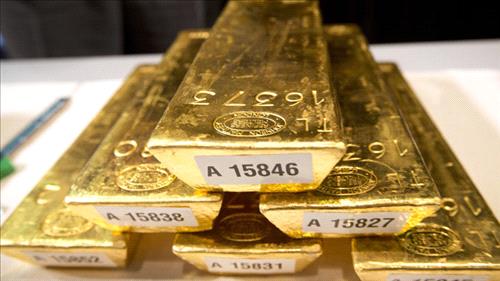Ammon News - LONDON/NEW YORK (Reuters) - Gold eased on Friday but notched its biggest weekly advance in nearly two years as fears of an imminent winding down of the U.S. Federal Reserve's monetary stimulus eased for now.
Spot bullion rose 4.8 percent for the week, the biggest weekly gain since October 2011. The metal rallied after Fed Chairman Ben Bernanke on Wednesday said the U.S. central bank needed to keep an stimulative monetary policy in place given low inflation and an uncertain job market.
Signs of some physical supply tightness in gold, as reflected by high premiums and record volume in the Shanghai Futures Exchange and a surge in gold lease rates, helped to limit bullion's losses on Friday.
Analysts said, however, recent gains in U.S. equities amid some positives signs for the economy and no indications of abatement in outflows from gold-backed exchange-traded funds could pressure the metal.
"The fact that the leading U.S. equity indices closed at record highs yesterday - which could prompt investors to switch once again from gold ETFs to equities - is problematic for gold," said Eugen Weinberg, head of commodity research at Commerzbank.
"Any prolonged recovery of the gold price is almost inconceivable unless the ETF outflows abate," Weinberg said.
Spot gold was down 0.2 percent at $1,282.06 an ounce by 3:03 p.m. EDT (1903 GMT), snapping a four-day winning streak.
U.S. Comex gold futures for August delivery settled down $2.30 to $1,277.60 an ounce, with trading volume about 20 percent below its 30-day average, preliminary Reuters data showed.
Gold pared losses after government data showed that U.S. producer prices rose more than expected in June, increasing gold's inflation-hedge appeal.
Holdings of the world's largest gold-backed ETF SPDR Gold Trust posted the biggest weekly loss of 2.6 percent since the end of April.
Investors now digested news that sovereign rating of France was downgraded by Fitch on Friday, and Italy's credit rating was cut by Standard & Poor's earlier in the week. Gold is a traditional safe haven against political and economic turmoil.
Gold's reaction was limited after Cypriot President Nicos Anastasiades said he hoped there would never be a need for the island to sell its gold reserves, an assessment stipulated in an international bailout for Cyprus.
SUPPLY TIGHTNESS
The cost of borrowing gold stayed near its highest level since January 2009, reflecting dwindling supplies from bullion banks after heavy liquidation and resilient demand for physical gold products.
Trading volumes for gold and silver on the Shanghai Futures Exchange (ShFE) have jumped to record highs a week after the bourse launched after-hours trading, driven by a surge in investment and hedging demand.
Also, premiums on Chinese gold and silver products stayed sharply higher than in the United States.
Meanwhile, total U.S. COMEX registered gold stocks fell to a 12-year low of less than 1 million ounces, underlying the tightness of the physical bullion market, said James Steel, HSBC's chief metals analyst.
Registered gold refers to the 100-ounce COMEX gold bullion bars that meet the standard of and are used to back requests for U.S. gold futures delivery.
Among other precious metals, silver fell 1.1 percent to $19.87 an ounce. Platinum inched down 0.1 percent to $1,402.99 an ounce, while palladium gained 0.1 percent to $716.97 an ounce.
